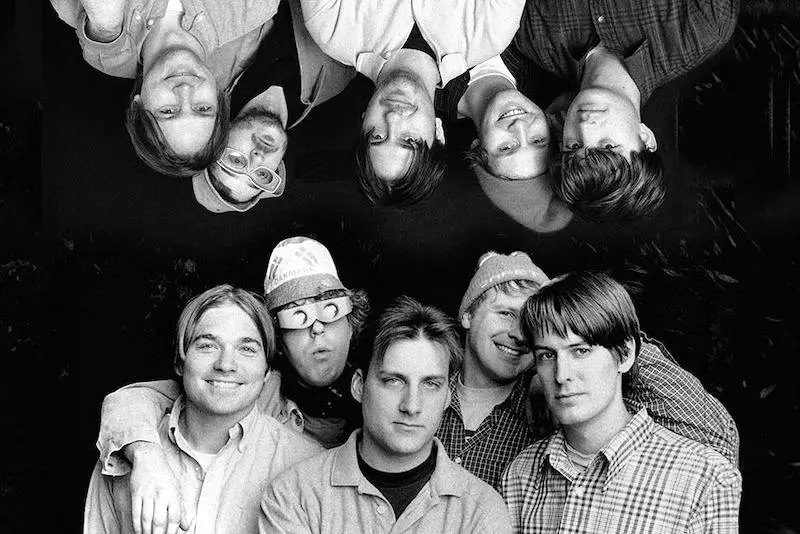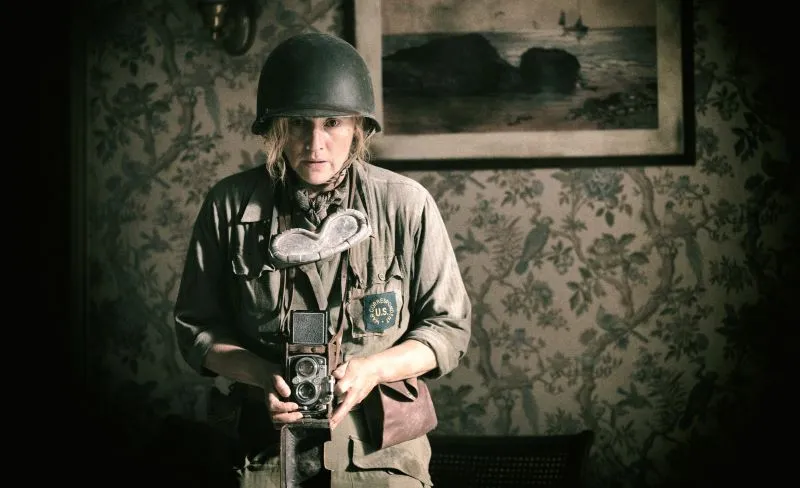Film Pavements, interview with director Alex Ross Perry and producer
Cinema / Interview - 02 October 2024

Pavement is the movie that premiered at the Venice Film Festival. It follows the band as they prepare for a sold-out reunion tour in 2022, while also following rehearsals for a musical based on their songs,
What is the most difficult to connect a fiction movie with the music?
Robert Green - producer. The most difficult thing is none of it makes natural sense. When Alex conceived of these strands, by the time they were actually produced, we didn't have a plan.
What I had to do was go back to being a fan myself of the band and start building from there. We found this piece of footage from Lance Bangs who filmed a lot of the archival that's in the film. Alex was waiting while an interview was happening and he was bored.
What a perfect little weird way to start the movie. Let's get some contacts and start with a split screen thing so people know what they're watching. What's the next thing? Now Alex, early in the process, was like, we've got to be inspired by the film Dunkirk.
Because there's all these different threads that then pay off in one way. Start that thread. We've got to start the fake biopic thread. We've got to start the musical thread. We've got to start these different threads. Once those threads were started, it was really its maintenance and balancing. When do you need to have them contradict each other? When do they come together? When do they get very far apart? A lot of people have been very kind and said, this looks like a lot of work.
It certainly was a lot of work. The structure wasn't the work. It was trying to make it deeper. The emotional experience of watching the film needed to be deeper than the silly ideas that we came up with. It needed to land harder. The characters needed to feel more realized. That's what takes the time. I had such joy in literally mimicking the structure of Wowie's Alley as a record, for example. Like, it's so fun to do that.
I could've done that. Like, if someone asked us at the premiere, like, how'd you know it was done? Well, we knew it was done when the Venice Film Festival called us and said, we'd gotten into film festivals before, but we couldn't say yes to them because we weren't done. But when it was like, okay, we're getting close to done and Venice wants to play it, all right, I guess we're done. Like, I could've kept editing this thing because it was such a joy. Yeah, I mean, to your question also, like...
Alex Ross - director. Their authorized autobiography, or something written by somebody who doesn't owe them final approval and therefore gets to approach their story from 360 degrees. Obviously that's what's going to reveal more truth about the subject.
Now their perspective should be one of those, but personally I'm more interested in the book, the film, the story, that zooms out from the cookie -cutter, traditional streaming content, as you say, approved version that just needs to be essentially a functional piece of marketing for this person's life and career.
Because that's not interesting to me, but it's interesting to me, like you ask, why we have so many of these, and what people want from them, and is there ever going to be an end to this? Or are we just going to be getting these things forever? So this movie was an opportunity because Pavement are a very conceptual and unpredictable artist. To say, like this band that is a very serious and important band is also a vessel, to ask exactly what you just asked. Why are there so many of these movies on streaming? Why do we watch people do these impressions of our favorite musicians? What does it mean that they do it, and what does it mean that we like it, or at least that we give it a pass?
And that to me felt like a really fun and funny and in keeping with Pavement's spirit ironic and pretty detached way of telling the story. Okay, what is the most difficult...
Why do you think there is so much interest-especially in online platforms-in telling the lives of singers, sa in documentary form than in fiction?
Alex Ross - director. I want to do a musical. I want to do a scripted segment. These are not about the same thing. The musical is for me living through it and in the movie for a few minutes of a two -hour runtime, the six -week process of breaking these complex, brilliant, funny, beautiful songs apart and watching a dozen performers and musicians who have never sung these songs put them back together.
And the entire conceit of the musical was, I want to do a thing that you don't usually get in a music film, which is an actual, critical, entertaining discussion of what is this band's music. Literally.
You're going to film scenes where this band's music that every viewer knows, if you know the band, is being introduced to ten people who have never heard it before. What does that say? And then the biopic has nothing to do with the five records that this band recorded.
It is only concerned with a heightened, silly version of what must it have been like to have been these characters in this moment in a cliche way. It is not about the song writing, the tuning, the lyrics. It's about an entire other part of the thing. Most movies feel like they can do both of these at the same time. I felt like they needed to be separate and then Robert would make them happen at the same time.
Robert Green - producer. Them happen at the same time yeah I mean I think I think the biopic is about the dumb expectations that people put on the band. In the movie, Malcolm says, "I write lyrics imagining what a cool singer might sing". You know, he's thinking of himself outside of himself. And he's, and I think that a lot of people, when Vince Neil, for example, is like, hey, I'm Vince Neil now, from Molly, like I'm like, I'm the Molly Crew guy.
He's outside of himself too, but it's like a crazy, I'm a rock star version of that, right? I think about this as a normal person more or less. And it happens to be a genius and a brilliant songwriter and an incredible musician and guitarist in every way, and has written my favorite songs.
But he was talking about all this stuff in the music itself. I was dressed for success, but success that never comes is in their first real record. It's like, you know, I think one time when we were talking about we should use that line over and over again in the movie, Alex was like, yeah, it just, it says, the guy was like, I already been like, yeah, this is my life, before it even started, really.
He was in his early 20s, like just saying this. So like that sort of referential, the question you asked, like, why the singer? There's a song called Our Singer, you know, in pavement, like where they're like talking about like, shoot the singer.
There's a lot of stuff about the singer, that sort of mythical cult of personality figure that Mount Mis deserves to be seen and is resistant to being seen as the entire time. You have to, if you're gonna make a pavement movie, you gotta make it about that deserved and resistant at the same time.
The movie will have, as a protagonist singer, have a particular empathy with the audience. As there is Born, the film Bohemian Rapsody about the Queen, the next movie on Bob Dylan. The lead singer is character you mean?
Alex Ross - director. Yeah, I mean, I don't know why. That is my question from this movie. My question is, I love listening to music, I love reading an interview with a musician, I love thinking about what led this artist down this path in their life.
I don't know why we want to see these things. I know that I like to watch them because they're often incredibly slick. The edges are sanded off, albeit maybe to the extent of detrimental editing, but they're just watchable.
Of course, they're also unwatchable at the same time. Many of these films are regarded as really awful, but they're still taken seriously. This is why I started thinking that they're the absolute lowest form of highbrow filmmaking, because they are highbrow filmmaking. They're financed and made and released exclusively for good reviews and awards. These are never made as a fun romp. The Motley Crue movie that I really like is made just like, this band was nuts, this is a fun movie, strap in, here comes some debauchery.
That's why I think that movie is good, because it doesn't try to become let the guy playing Vince Neil win an Oscar. But it is just, that's my question, why do we like this? Why do I like this? Why do I like watching famous actors do impressions of other people who are maybe still alive and can speak for themselves?
It just gets at this idea of, why do we make anything? Why is this better than a fiction? What would you rather watch? A scripted pavement movie starring Joe for two hours, or just an original movie about a bunch of slacker guys in a band in the 90s?
Well, one of those no one would ever pay for, and one of them someone might actually make. Yeah, and I think there's also a deeper question too, like, in the movie.
© All right Reserved












